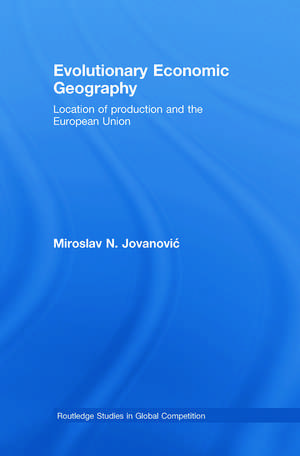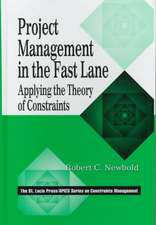Evolutionary Economic Geography: Location of production and the European Union: Routledge Studies in Global Competition
Autor Miroslav Jovanovicen Limba Engleză Paperback – 15 iun 2012
Jovanovic argues that the economy is a complex and constantly adaptive system which is almost always outside equilibrium. Building on this, he suggests that there is an important lacuna in our understanding of evolutionary spatial economics and that there is much space for further multidisciplinary research in this academic and practical area. This book offers an evolutionary and disequilibrium analysis of the subject and makes parallels, where appropriate and possible, among economics, geography, physics, biology and art. It considers key areas in theory, market and production structure, spatial location of domestic and foreign firms, as well as regional policy. In addition, there are references to policy intervention; importance of investment in local social stability, education and training; as well as to uncontrollable variables that are beyond the influence of firms, industries, regions or public authorities. The author offers various evolutionary insights and alternatives to the pure neoclassical equilibrium economic model.
| Toate formatele și edițiile | Preț | Express |
|---|---|---|
| Paperback (1) | 480.33 lei 43-57 zile | |
| Taylor & Francis – 15 iun 2012 | 480.33 lei 43-57 zile | |
| Hardback (1) | 1186.50 lei 43-57 zile | |
| Taylor & Francis – 7 oct 2008 | 1186.50 lei 43-57 zile |
Din seria Routledge Studies in Global Competition
-
 Preț: 327.10 lei
Preț: 327.10 lei -
 Preț: 415.29 lei
Preț: 415.29 lei - 18%
 Preț: 1056.80 lei
Preț: 1056.80 lei -
 Preț: 466.88 lei
Preț: 466.88 lei - 18%
 Preț: 1123.68 lei
Preț: 1123.68 lei - 20%
 Preț: 274.33 lei
Preț: 274.33 lei -
 Preț: 463.40 lei
Preț: 463.40 lei -
 Preț: 140.53 lei
Preț: 140.53 lei - 18%
 Preț: 1114.70 lei
Preț: 1114.70 lei -
 Preț: 462.85 lei
Preț: 462.85 lei - 25%
 Preț: 829.02 lei
Preț: 829.02 lei - 18%
 Preț: 1166.68 lei
Preț: 1166.68 lei - 18%
 Preț: 1066.09 lei
Preț: 1066.09 lei - 28%
 Preț: 850.37 lei
Preț: 850.37 lei - 18%
 Preț: 1109.99 lei
Preț: 1109.99 lei -
 Preț: 496.35 lei
Preț: 496.35 lei - 22%
 Preț: 297.62 lei
Preț: 297.62 lei - 18%
 Preț: 1282.35 lei
Preț: 1282.35 lei -
 Preț: 464.93 lei
Preț: 464.93 lei - 18%
 Preț: 1062.98 lei
Preț: 1062.98 lei - 12%
 Preț: 339.31 lei
Preț: 339.31 lei -
 Preț: 395.55 lei
Preț: 395.55 lei -
 Preț: 472.28 lei
Preț: 472.28 lei - 20%
 Preț: 248.97 lei
Preț: 248.97 lei -
 Preț: 471.08 lei
Preț: 471.08 lei - 34%
 Preț: 1185.83 lei
Preț: 1185.83 lei - 24%
 Preț: 129.96 lei
Preț: 129.96 lei - 18%
 Preț: 1162.39 lei
Preț: 1162.39 lei -
 Preț: 405.80 lei
Preț: 405.80 lei - 18%
 Preț: 1055.38 lei
Preț: 1055.38 lei - 28%
 Preț: 826.86 lei
Preț: 826.86 lei -
 Preț: 446.95 lei
Preț: 446.95 lei - 18%
 Preț: 1064.01 lei
Preț: 1064.01 lei - 25%
 Preț: 527.96 lei
Preț: 527.96 lei - 18%
 Preț: 1052.35 lei
Preț: 1052.35 lei - 18%
 Preț: 1172.50 lei
Preț: 1172.50 lei - 18%
 Preț: 718.40 lei
Preț: 718.40 lei - 25%
 Preț: 557.95 lei
Preț: 557.95 lei - 28%
 Preț: 820.40 lei
Preț: 820.40 lei -
 Preț: 466.49 lei
Preț: 466.49 lei - 34%
 Preț: 988.54 lei
Preț: 988.54 lei - 18%
 Preț: 1168.76 lei
Preț: 1168.76 lei - 18%
 Preț: 1056.00 lei
Preț: 1056.00 lei
Preț: 480.33 lei
Nou
Puncte Express: 720
Preț estimativ în valută:
91.94€ • 99.90$ • 77.28£
91.94€ • 99.90$ • 77.28£
Carte tipărită la comandă
Livrare economică 21 aprilie-05 mai
Preluare comenzi: 021 569.72.76
Specificații
ISBN-13: 9780415632355
ISBN-10: 0415632358
Pagini: 512
Ilustrații: 23 black & white illustrations, 9 black & white tables, 1 black & white halftones, 22 black & white line drawings
Dimensiuni: 156 x 234 mm
Greutate: 0.71 kg
Ediția:1
Editura: Taylor & Francis
Colecția Routledge
Seria Routledge Studies in Global Competition
Locul publicării:Oxford, United Kingdom
ISBN-10: 0415632358
Pagini: 512
Ilustrații: 23 black & white illustrations, 9 black & white tables, 1 black & white halftones, 22 black & white line drawings
Dimensiuni: 156 x 234 mm
Greutate: 0.71 kg
Ediția:1
Editura: Taylor & Francis
Colecția Routledge
Seria Routledge Studies in Global Competition
Locul publicării:Oxford, United Kingdom
Public țintă
Postgraduate and UndergraduateRecenzii
"Nearly half a century ago, Walter Isard, the founder of regional science, suggested in his seminal book Location and Space Economy two promising approaches to further development of economic geography: the monopolistic competition approach and the evolutionary approach. As is well known, since the late 1980s, the monopolistic competition approach has been vigorously explored in the New Economic Geography. Then, the exploration of evolutionary approach started in the late 1990s, following the development of evolutionary economics and complexity theory. Although it is still in its infancy, evolutionary approach has been contributing significantly to the enrichment of economic geography, adding new perspectives to the longterm process of structural change in space and in time, In Evolutionary Economic Geography, Miroslav N. Jovanovic´ presents in lucid manner the state of arts in economic geography with a special focus on evolutionary approach. The book covers not only theory but also regional policy and location of production in the context of global economy. I enjoyed reading this wonderfully informative book and learned a lot, and so will you."
Masahisa Fujita, President of the Research Institute of Economy, Trade and Industry, Tokyo
Masahisa Fujita, President of the Research Institute of Economy, Trade and Industry, Tokyo
Cuprins
Table of Contents, Preface, Foreword, I. Introduction, II. Theory, III. Regional policy, IV. Market structure and location of production, V. International firms, VI. Conclusions, VII. Bibliography
Notă biografică
Miroslav N. Jovanovic is Economic Affairs Officer at the United Nations Economic Commission for Europe, Geneva.
Descriere
This new book brings evolutionary economics to bear upon economic geography in a coordinated study of the European Union. Jovanovic takes up a hot and increasingly important topic that is rarely addressed in such an accessible fashion.






















